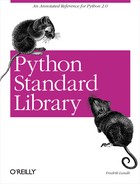The Bastion module, shown in Example 14-7, allows you to control how a given object is used. It can
be used to pass objects from unrestricted parts of your application to
code running in restricted mode.
To create a restricted instance, simply call the
Bastion wrapper. By default, all instance
variables are hidden, as well as all methods that start with an
underscore.
Example 14-7. Using the Bastion Module
File: bastion-example-1.py
import Bastion
class Sample:
value = 0
def _set(self, value):
self.value = value
def setvalue(self, value):
if 10 < value <= 20:
self._set(value)
else:
raise ValueError, "illegal value"
def getvalue(self):
return self.value
#
# try it
s = Sample()
s._set(100) # cheat
print s.getvalue()
s = Bastion.Bastion(Sample())
s._set(100) # attempt to cheat
print s.getvalue()
100
Traceback (innermost last):
...
AttributeError: _setYou can control which functions to publish. In Example 14-8,
the internal method can be called from outside, but the
getvalue no longer works.
Example 14-8. Using the Bastion Module with a Non-Standard Filter
File: bastion-example-2.py
import Bastion
class Sample:
value = 0
def _set(self, value):
self.value = value
def setvalue(self, value):
if 10 < value <= 20:
self._set(value)
else:
raise ValueError, "illegal value"
def getvalue(self):
return self.value
#
# try it
def is_public(name):
return name[:3] != "get"
s = Bastion.Bastion(Sample(), is_public)
s._set(100) # this works
print s.getvalue() # but not this
100
Traceback (innermost last):
...
AttributeError: getvalue..................Content has been hidden....................
You can't read the all page of ebook, please click here login for view all page.
